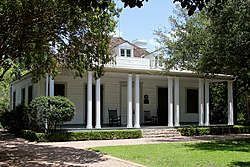French Legation
|
French Legation
|
|

The French Legation now serves as a period museum and host to a variety of community events.
|
|
| Location | 802 San Marcos St. Austin, Texas, USA |
|---|---|
| Coordinates | 30°16′01″N 97°43′56″W / 30.26694°N 97.73222°WCoordinates: 30°16′01″N 97°43′56″W / 30.26694°N 97.73222°W |
| Built | 1841 |
| NRHP Reference # | 69000213 |
| RTHL # | 14828 |
| TSAL # | 602 |
| Significant dates | |
| Added to NRHP | November 25, 1969 |
| Designated RTHL | 1962 |
| Designated TSAL | 5/28/1981 |
The French Legation is an historic legation building in eastern Austin, Texas, built in 1841 to represent the French government in the new Republic of Texas.
It is among the oldest extant frame structures in Austin. The building and its surroundings were added to the National Register of Historic Places in 1969. The French Legation is also a Recorded Texas Historic Landmark, a City of Austin Historic Landmark, and a Texas State Antiquities Landmark.
Until recently, the historic site and its buildings were managed and operated by a professional museum staff hired by the site's custodians the Daughters of the Republic of Texas as custodians for the State of Texas which holds title to the property.
After Texas declared independence from Mexico in 1836, France was one of two countries (the other being the United States) to officially recognize Texas as an independent state. The Treaty of Amity, Navigation, and Commerce between the two countries formalized this recognition in September 25, 1839. France assigned Monsieur Jean Pierre Isidore Alphonse Dubois, a secretary to the French Legation in Washington, to be the new chargé d'affaires to the Republic of Texas, representing the King of France, Louis Philippe.
The legation structure was completed in 1841, approximately a half-mile east of the city center. Dubois gave multi-course dinner parties in the cabin he rented downtown as his mansion was built, and worked with legislators to bring French settlers to Texas. Count de Saligny's stay in Austin was not, however, without conflict. Dubois and the inn-keeper Richard Bullock were enemies. His conflict with Austinites even came to blows in the so-called 1841 Pig War, when his butler killed several havoc-wreaking pigs belonging to Bullock and was in turn assaulted by Bullock.
...
Wikipedia


